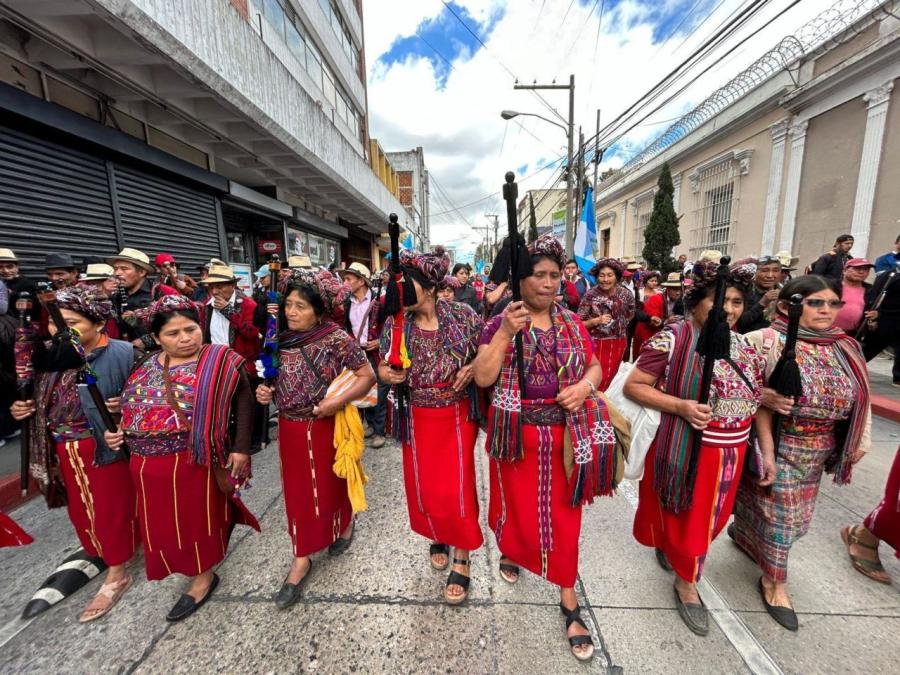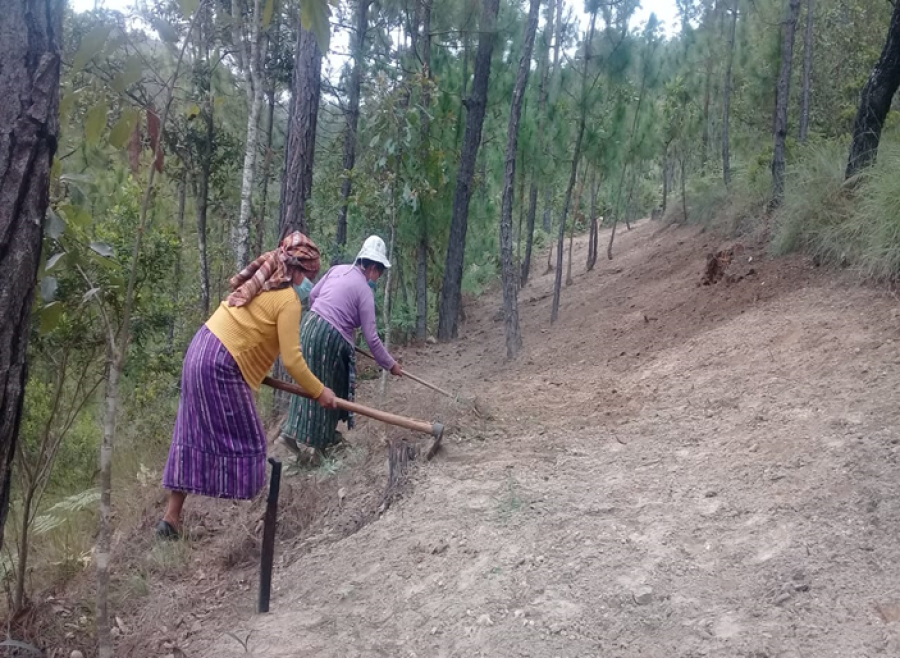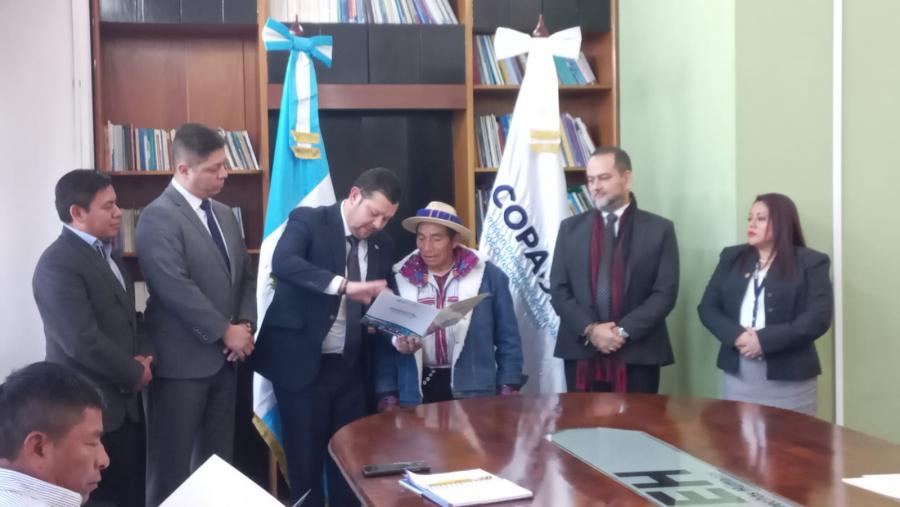As most Cultural Survival Quarterly readers know, Mayans in the western highlands of Guatemala have suffered a protracted (10-year) period of attempted ethnocide. What some may not know, however, is that the Mayan response to this assault on its culture has not been one of withdrawal of passivity. A growing number of Mayan people, who could perhaps be termed Mayan intellectuals, are attending to the rebirth of Mayan culture in a more self-conscious and self-actualizing form.
One reason that this rebirth is possible today is that before and even during the period of violence (known as la violencia), many Mayan people sent their children to school for higher education - both teacher training and university. Interestingly, the student body at the western branch of the University of San Carlos is now 40 percent self-recognized Mayans; an equal number of Mayan students are attending classes on the Guatemala City campus. Ten years ago, there were virtually no people who retained an "Indian" identity in the university system; today most Mayan students maintain their ethnic identity.
Educated Mayans have developed a wide network of small development organizations whose basic intent is to help development projects in Mayan communities operate in such a way that they actually work to bring the kind of development that Mayan communities want and need, and do not destroy Mayan culture. Among these Mayan development organizations are Cocadi in Chimaltenango, Coinde in Sololà, and CDRO in Totonicapàn. Completely Mayan in staff, orientation, and philosophy, each group tends to serve communities of the same language group in its local area.
Enter CISMA
In addition, there is now a Mayan research organization, called CISMA (Centro de Investigaciones Socioculturales Mayas). CISMA's main office is located in Quezaltenango, the largest city in the western highlands, and is run entirely by Mayan research investigators. The organization conducts research on development and other social needs throughout the entire western highlands with the assistance of trained bilingual fieldworkers.
CISMA was created early in 1989 with the support of several grants given to determine the economic impact of the last 10 years of violence on western Guatemala. General information was gathered in each of the seven westernmost departments in the highlands: Chimaltenango, Sololà, El Quiché, Huehuetenango, Totonicapàn, Quezaltenango, and San Marcos. This area encompasses most Mayan communities in Guatemala, with the exception of those in the Verapaces.
To obtain the relevant information, I worked with Guillermo Rodríguez Guajàn of Tecpan, Guatemala, now CISMA's director, who had spent 10 years as regional director of the nontraditional educational program in the western highlands (supervising a large and mostly non-Mayan staff). His connections in the region allowed us to recruit bilingual, experienced research investigators to work in their own economic linguistic areas (we divided the highlands into 15 such areas). After several weeks of training in interviewing techniques and developing a questionnaire, our investigators (speakers of Quiché, Caqchiquel, Mam, Kanjobal, Tzutujil, Jacalteca, Ixil, and several other languages) went into their home areas to obtain demographic, cultural, social, and economic information on every municipio (township) in the area we defined. Since then CISMA's permanent research staff (director, secretary, and two field researchers) has put the information in dBase and has analyzed and tabulated much of the information obtained in the interviews.
Guillermo Rodríguez, who is currently writing his university thesis in education and is president of the Escritores Mayenses (Mayan Writers' Organization), works half-time overseeing CISMA's various operations. One of the permanent research staff, Olga Xicarà, is obtaining her licenciatura (university degree) in social work and is well trained in data analysis. Another staff member, Ever Lacàn Menchú, who is attending the University of San Carlos in law, has become fluent in using dBase, Word Perfect 5.0, and various computer graphic techniques. CISMA's additional 12 field researchers are not permanent members of the organization, but work on a contract basis, working for as little as two weeks or as long as a year.
CISMA's Goals
CISMA aims to be a Mayan research organization that can carry out research of interest to the Mayan community and assist in and advise on future development projects in Guatemala - ultimately furthering the interests and objectives of Mayan communities. Not only is CISMA capable of finding and training local Mayan research investigators to carry out general survey work, but it is also gaining the capacity to publish booklets and pamphlets in Spanish or a Mayan language for local distribution.
Recently, on their own initiative, the CISMA staff members developed a project to investigate the current organization and operation of the consejos deancianos (traditional councils of elders) in several communities throughout the highlands. These councils appear to still direct or orient various activities in their communities, serving as a constant moral presence. This project aims to discover what new forms might have evolved since the 1952 election laws (which eliminated the political functions of traditional consejos) that continue to allow Mayan traditions of leadership and consensus to exist. Consejos continue to play a key role in determining the kind of success that any development project brought to a particular community will have. One alternative CISMA is considering is developing ways to put the financial and operative powers of development projects in the hands of functioning consejos instead of with the nontraditional youths usually selected for such functions, who often end up alienating - and alienated from - their communities.
The ability of CISMA's investigators to obtain information in the community of choice is extraordinary. In one community in which the study of the consejos is underway, for example, the investigators have recruited one of the elders to help them devise an appropriate set of questions and issues relevant to the study. The "elder," who is also literate and bilingual, has been allowed to tape discussions with the consejo members about its functions and dilemmas (in Quiché). The CISMA staff members are now transcribing these tapes in order to present the local view of development projects.
Anyone familiar with Guatemala might be concerned about the political dangers of supporting such a research enterprise at this time. Remember, however, that CISMA is a strictly research organization, not a political one. Its supporters will work in their own communities and will know exactly what the local political situation is at any given time. They will not take on any work or project that will endanger either themselves, their communities, or the organization. To the extent that CISMA gains an international reputation, it will if anything provide some political protection to its staff and supporters.
How You Can Help
What can CISMA do for you, and what can you do to help CISMA? If you are planning any type of development project in the highlands of Guatemala, you should discuss your project with CISMA. You should be open to any suggestions regarding the appropriateness of your research design with respect to meeting community needs and goals. CISMA'S staff members will try to find the appropriate assistants and project directors for your project; they can also help monitor ongoing projects. CISMA's overhead will be no more than necessary to maintain its existence (i.e., a modest space, some basic office and computer equipment, and the core staff).
If you plan to spend some time in Guatemala in the foreseeable future and have any special research, writing, computer, or other skills that you would be willing to share with the CISMA staff, please offer your services.
If you would like to make a donation (tax deductible) to CISMA, send a US check made out to Plumsock Mesoamerican Studies (P.O. Box 38, South Woodstock, VT 05071) with a note indicating that you would like to donate these funds to CISMA; that foundation will see that the funds go to CISMA. You might also consider donating office or printing equipment. If you have such equipment, you can contact me about how you could send it.
Article copyright Cultural Survival, Inc.



